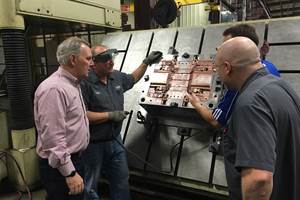Turning Technology Into Tax Credits
A program that allows businesses and industries to donate equipment or money in return for tax credit has been developed by The Vocational Administrators of Pennsylvania.
A program that would allow businesses and industries to donate equipment or money to be used for the purchase of state-of-the-art equipment in return for tax credit has been developed by The Vocational Administrators of Pennsylvania (VAP) to address one of the biggest challenges facing business today - finding quality, skilled workers.
According to VAP executive director Jacqueline Cullen, this non-profit organization's purpose is to promote workforce development, "especially through quality vocational, technical educational programs."
The tax credit program, which is funded through the Department of Community and Economic Development in Pennsylvania, is a neighborhood assistance act program or a state tax credit program, Cullen explains. "If a business wants to donate equipment to a vocational/technical school or program, the donation would be processed through our organization," she says. "For instance, if a business donated a 10 thousand dollar piece of equipment to a machining program, they would receive a tax credit from the Department of Community and Economic Development worth 50 percent of the donation, which can be used against their state tax bill at any point for the next five years. The maximum tax credit available to an individual business is limited to $250,000 a year.
"In addition, they also would qualify for their federal tax deduction, so when all is said and done the donation really costs them 24 cents on the dollar," Cullen continues. "Once you take the state tax credit and the federal tax deduction it's a win-win situation: the school gets up-to-date equipment, the business is assured that its future employees are trained on the proper equipment, and the business gets a nice tax credit and deduction."
To ensure that the equipment is state-of-the-art, only equipment manufactured after January 1, 1996 will be accepted, Cullen notes. Schools must document that the equipment is necessary to carry out the curriculum of the Pennsylvania Department of Education's (PDE) approved vocational technical-educational programs, at least two of which must be trade and industrial programs.
Cullen says that VAP is targeting some specific areas like information technology and manufacturing technology. "These are just some of the areas where there's a real need for workers," she comments. "We also are looking at areas where the jobs are and we know there will be job growth, as well as industries that have an older workforce and we know there will be waves of retirement in the next few years."
The challenge lies in getting the word out, Cullen notes, and involving businesses. "Get involved with the schools - especially if there is a vocational/technical school in the area," she says. "If I were a moldmaker, I would make a real effort to talk to a director or principal of the school. Most of these schools have advisory committees for every one of their programs - moldmakers should volunteer to be on these committees. They help set the curriculum for the program, recommend what equipment ought to be used, what equipment the students ought to be trained on, etc.
"They (moldmakers) also should make an effort to promote their careers more, whether that means by volunteering to speak at career fairs, at middle schools and high schools," Cullen continues. "Most students just don't realize the jobs that are out there and the benefits of these jobs - they don't understand the thousands of careers that are available and that some of the careers they don't know about pay more than those they do know about. We have to help parents and children understand there are excellent career opportunities available without a four-year degree."
To get involved, call Jacqueline Cullen of VAP (Camp Hill, PA) at (717) 761-3381.
Related Content
OEE Monitoring System Addresses Root Cause of Machine Downtime
Unique sensor and patent-pending algorithm of the Amper machine analytics system measures current draw to quickly and inexpensively inform manufacturers which machines are down and why.
Read MoreHow to Improve Your Current Efficiency Rate
An alternative approach to taking on more EDM-intensive work when technology and personnel investment is not an option.
Read MoreTop 10 Topics to Cover During an ISO 9001 Manufacturing Audit
Take a look at this practical hands-on approach to conducting a quality audit.
Read MoreDynamic Tool Corporation – Creating the Team to Move Moldmaking Into the Future
For 40+ years, Dynamic Tool Corp. has offered precision tooling, emphasizing education, mentoring and innovation. The company is committed to excellence, integrity, safety and customer service, as well as inspiring growth and quality in manufacturing.
Read MoreRead Next
How to Use Strategic Planning Tools, Data to Manage the Human Side of Business
Q&A with Marion Wells, MMT EAB member and founder of Human Asset Management.
Read MoreReasons to Use Fiber Lasers for Mold Cleaning
Fiber lasers offer a simplicity, speed, control and portability, minimizing mold cleaning risks.
Read More



.jpg;maxWidth=300;quality=90)












